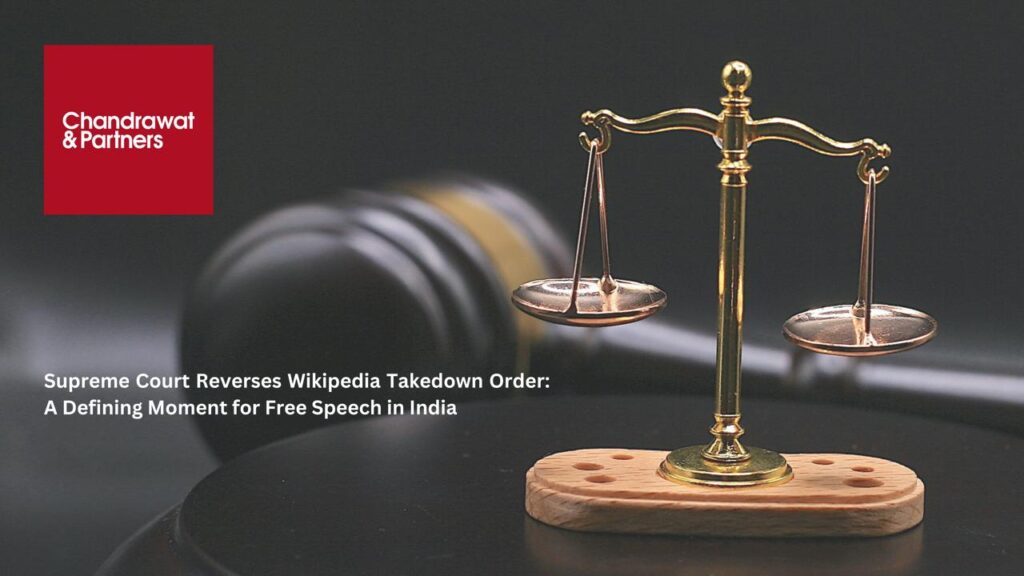Home > Recent Judgements > Supreme Court Reverses Wikipedia Takedown Order: A Defining Moment for Free Speech in India
May 09, 2025
Supreme Court Reverses Wikipedia Takedown Order: A Defining Moment for Free Speech in India
Introduction: Speech in the Age of Algorithms and Censorship
On May 9, 2025, the Supreme Court of India delivered a powerful reminder that freedom of speech and access to information remain core pillars of democracy even in the digital age. By overturning a Delhi High Court order that had directed the Wikimedia Foundation to remove a Wikipedia article referencing the news agency ANI, the Court struck a critical balance between individual reputational interests and the public’s right to know.
This ruling is not just a win for Wikipedia it is a landmark reaffirmation of how Indian constitutional values apply to decentralized, global, user-driven platforms. It sends a clear message: judicial censorship cannot become a tool to shield powerful entities from public accountability.
The Case at a Glance
The Delhi High Court had previously ordered the removal of a Wikipedia article related to ANI, citing alleged defamation and misinformation. ANI contended that the content damaged its reputation and was not subject to journalistic standards.
The Supreme Court bench, led by Chief Justice D.Y. Chandrachud, rejected this logic, observing that open-source, crowd-edited platforms like Wikipedia function differently from traditional publishers. The order to delete the page was deemed “disproportionate” – a constitutional red flag under Article 19(1)(a) of the Indian Constitution, which protects free speech.
Why This Ruling Matters: Beyond the Headlines
- The Judiciary’s Role in Digital Expression
The judgment clarifies an increasingly urgent question in Indian jurisprudence: What is the judiciary’s role in regulating online content? While courts must safeguard against defamation and false information, they must also resist becoming arbiters of truth in public discourse.
By overturning the takedown, the Supreme Court refused to set a precedent where courts could be used to erase or silence criticism on public platforms, especially where there is no clear evidence of malice or inaccuracy.
- Differentiating Platforms from Publishers
The Court acknowledged the fundamental difference between user-edited platforms (like Wikipedia) and traditional media. Wikipedia is governed by open-source editorial norms, with transparent revision histories and community moderation. Treating it as a publisher under defamation law mischaracterizes its role and risks stifling collaborative knowledge creation.
This distinction aligns India’s legal approach with global norms that have long recognized the limited liability of intermediaries and open platforms, especially under Section 79 of the Information Technology Act, 2000.
- Transparency in Democratic Institutions
The ruling’s most powerful theme is its reaffirmation that institutions in a democracy—including the media and the courts themselves—must remain subject to public scrutiny. Suppressing a Wikipedia article merely because it covers a legal dispute involving a major news agency is antithetical to the principles of transparency and free debate.
As the Court put it, criticism, however uncomfortable, is not defamation unless it crosses into demonstrable falsehood or malice.
Broader Legal and Policy Implications
This decision has ripple effects across India’s regulatory, legal, and policy landscape:
- Intermediary Liability: It strengthens protections for online platforms, reinforcing that they cannot be held liable for user-generated content without clear evidence of negligence or complicity.
- Judicial Restraint in Digital Takedowns: Courts will now have to justify takedown orders more rigorously, applying proportionality and necessity tests before interfering with online content.
- Precedent for Future Censorship Cases: This ruling may serve as binding precedent for future cases involving online expression, misinformation claims, and content moderation.
- Global Signal: The judgment signals to international digital platforms that India remains committed to a balanced, rights-based regulatory framework, which is critical as the government continues refining its digital laws.
Conclusion: A Constitutional Compass for the Internet Age
In an era of rising digital censorship and tightening state control over online platforms globally, the Indian Supreme Court’s decision stands out as a thoughtful, rights-oriented interpretation of freedom in the internet age.
This isn’t just a legal victory for Wikipedia or a rebuke to one news agency. It’s a clarion call for courts, regulators, and citizens to defend the public square, online and offline, as a space for dissent, discussion, and democratic accountability.
The Constitution, as the Court reaffirmed, was not written to shield reputations from discomfort but to protect the truth from being buried under convenience.
For more information or queries, please email us at
enquiries@chandrawatpartners.com





